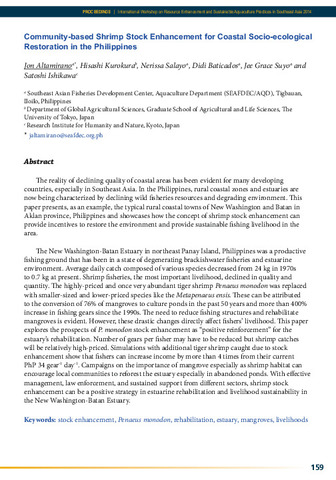Community-based shrimp stock enhancement for coastal socio-ecological restoration in the Philippines
Share
Abstract
The reality of declining quality of coastal areas has been evident for many developing countries, especially in Southeast Asia. In the Philippines, rural coastal zones and estuaries are now being characterized by declining wild fisheries resources and degrading environment. This paper presents, as an example, the typical rural coastal towns of New Washington and Batan in Aklan province, Philippines and showcases how the concept of shrimp stock enhancement can provide incentives to restore the environment and provide sustainable fishing livelihood in the area.The New Washington-Batan Estuary in northeast Panay Island, Philippines was a productive fishing ground that has been in a state of degenerating brackishwater fisheries and estuarine environment. Average daily catch composed of various species decreased from 24 kg in 1970s to 0.7 kg at present. Shrimp fisheries, the most important livelihood, declined in quality and quantity. The highly-priced and once very abundant tiger shrimp Penaeus monodon was replaced with smaller-sized and lower-priced species like the Metapenaeus ensis. These can be attributed to the conversion of 76% of mangroves to culture ponds in the past 50 years and more than 400% increase in fishing gears since the 1990s. The need to reduce fishing structures and rehabilitate mangroves is evident. However, these drastic changes directly affect fishers livelihood. This paper explores the prospects of P. monodon stock enhancement as positive reinforcement for the estuary s rehabilitation. Number of gears per fisher may have to be reduced but shrimp catches will be relatively high-priced. Simulations with additional tiger shrimp caught due to stock enhancement show that fishers can increase income by more than 4 times from their current PhP 34 gear-1 day-1. Campaigns on the importance of mangrove especially as shrimp habitat can encourage local communities to reforest the estuary especially in abandoned ponds. With effective management, law enforcement, and sustained support from different sectors, shrimp stock enhancement can be a positive strategy in estuarine rehabilitation and livelihood sustainability in the New Washington-Batan Estuary.
Suggested Citation
Altamirano, J., Kurokura, H., Salayo, N. D., Baticados, D., Suyo, J. G., & Ishikawa, S. (2015). Community-based shrimp stock enhancement for coastal socio-ecological restoration in the Philippines. In M. R. R. Romana-Eguia, F. D. Parado-Estepa, N. D. Salayo, & M. J. H. Lebata-Ramos (Eds.), Resource Enhancement and Sustainable Aquaculture Practices in Southeast Asia: Challenges in Responsible Production of Aquatic Species: Proceedings of the International Workshop on Resource Enhancement and Sustainable Aquaculture Practices in Southeast Asia 2014 (RESA) (pp. 159-167). Tigbauan, Iloilo, Philippines: Aquaculture Dept., Southeast Asian Fisheries Development Center.
Subject
environmental degradation  ; resource management
; resource management  ; stocking (organisms)
; stocking (organisms)  ; Sociological aspects; sustainable fishing
; Sociological aspects; sustainable fishing  ; resource conservation
; resource conservation  ; sustainability
; sustainability  ; coastal zone management
; coastal zone management  ; habitat improvement (biological)
; habitat improvement (biological)  ; livelihoods
; livelihoods  ; catch composition
; catch composition  ; coastal zone
; coastal zone  ; socioeconomic aspects
; socioeconomic aspects  ; fishery management
; fishery management  ; shrimp fisheries
; shrimp fisheries  ; Environmental effects; brackishwater environment
; Environmental effects; brackishwater environment  ; mangroves
; mangroves  ; Penaeus monodon; Metapenaeus ensis; Philippines
; Penaeus monodon; Metapenaeus ensis; Philippines
 ; resource management
; resource management  ; stocking (organisms)
; stocking (organisms)  ; Sociological aspects; sustainable fishing
; Sociological aspects; sustainable fishing  ; resource conservation
; resource conservation  ; sustainability
; sustainability  ; coastal zone management
; coastal zone management  ; habitat improvement (biological)
; habitat improvement (biological)  ; livelihoods
; livelihoods  ; catch composition
; catch composition  ; coastal zone
; coastal zone  ; socioeconomic aspects
; socioeconomic aspects  ; fishery management
; fishery management  ; shrimp fisheries
; shrimp fisheries  ; Environmental effects; brackishwater environment
; Environmental effects; brackishwater environment  ; mangroves
; mangroves  ; Penaeus monodon; Metapenaeus ensis; Philippines
; Penaeus monodon; Metapenaeus ensis; Philippines
Taxonomic term
Related items
Showing items related by title, author, creator and subject.
-
Proceedings of the Regional Seminar on Integrated Coastal Resources Management in Southeast Asia: Lessons Learned through Integrated Coastal Resources Management in Pathew District, Chumphon Province (ICRM-PD)
Training Department, Southeast Asian Fisheries Development Center (Training Department, Southeast Asian Fisheries Development Center, 2007-09)The proceedings contain the papers that were presented at a regional seminar on integrated coastal resources management. The seminar was conducted to 1) report the achievement and outcome of the project during its 5-year ... -
Marine Environments and Phytoplankton in the Area of the Locally Based Coastal Fisheries Management Project: Pathew District, Chumphon Province
Kajonwattanakul, Sumana; Singharachai, Chumchoke (Training Department, Southeast Asian Fisheries Development Center, 2007)Investigations on marine environments were carried out at 10 sampling stations in the area of the Locally-Based Coastal Fisheries Management Project, Pathew District, Chumphon Province from 2002 to 2006. The depth of the ... -
Women's Group Development: Integrated Coastal Resources Management in Pathew District (ICRM-PD), Chumphon Province
Ruangsivakul, Sumitra (Training Department, Southeast Asian Fisheries Development Center, 2007)The Integrated Coastal Resources Management Project (ICRM-PD) was established in Pathew District, Chumphon Province, on 9 November 2001 as a collaborative effort between SEAFDEC/TD and the DOF of Thailand. The project aims ...





